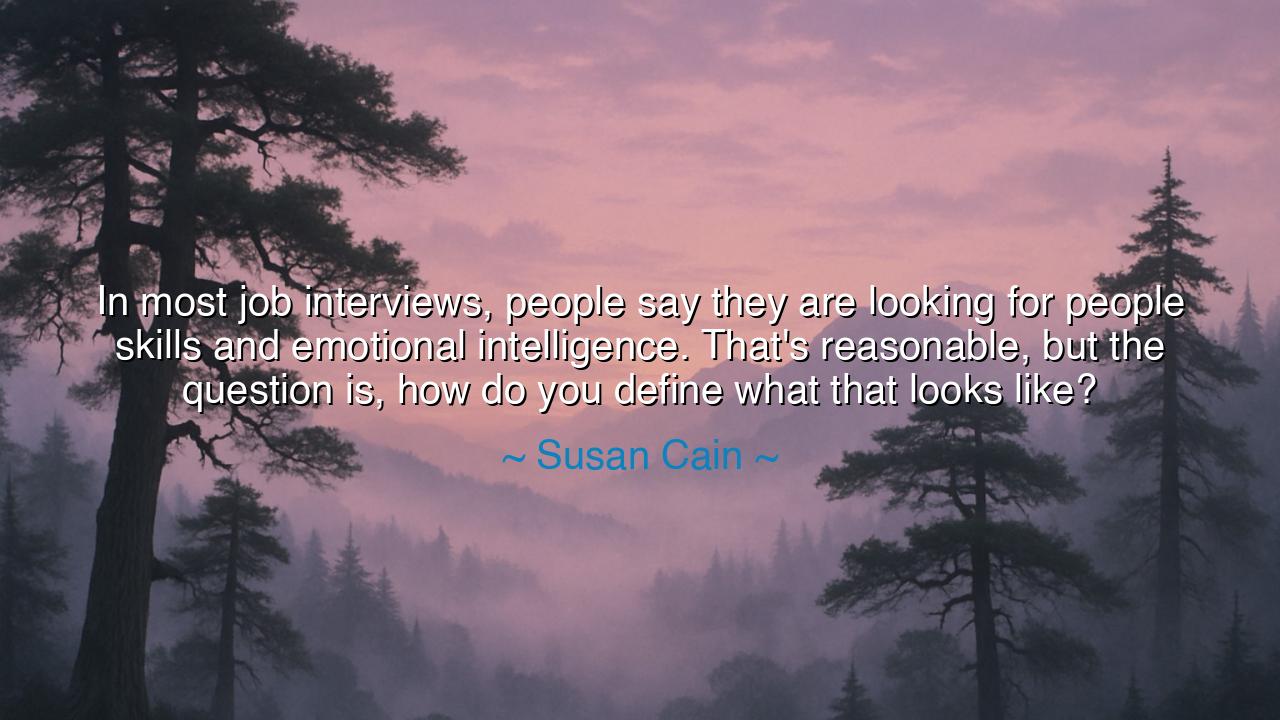
In most job interviews, people say they are looking for people
In most job interviews, people say they are looking for people skills and emotional intelligence. That's reasonable, but the question is, how do you define what that looks like?






The words “In most job interviews, people say they are looking for people skills and emotional intelligence. That’s reasonable, but the question is, how do you define what that looks like?” were spoken by Susan Cain, the quiet voice of the introverted revolution. Beneath their calm phrasing lies a question that cuts to the heart of modern society’s confusion about connection, empathy, and understanding. Cain does not mock the pursuit of “people skills” or “emotional intelligence”—she honors them—but she asks that we look deeper, beyond the polished smile and the practiced charm, to discover what true human wisdom really looks like in the soul of a person.
For in this age of noise and speed, many wear the mask of sociability while their hearts remain untouched. We live in a world where confidence is mistaken for competence, and where charisma often eclipses character. The marketplace praises the loud, the bold, the endlessly extroverted—but Cain’s question pierces this illusion: What does emotional intelligence truly mean? Is it the art of speaking smoothly? The ability to command a room? Or is it something gentler and more profound—the quiet strength to listen, to understand, and to meet another soul without judgment?
To answer this, we must turn our gaze backward, to the wisdom of the ancients. Consider Marcus Aurelius, emperor of Rome, whose power was vast but whose demeanor was humble and composed. His greatness lay not in fiery speeches or cunning politics, but in his deep self-awareness and calm mastery of emotion. When insulted, he did not rage. When praised, he did not boast. He listened, reflected, and acted with mercy and reason. In him, we see the living portrait of emotional intelligence—not as performance, but as inner harmony.
Likewise, in the life of Mother Teresa, we see “people skills” of a different kind—born not from charm, but from compassion. She did not dazzle or persuade; she simply saw others as human beings worthy of love. Her gift was the ability to feel deeply, to sense pain without words, and to offer presence rather than pretense. That, too, is what it “looks like”—a heart tuned to the quiet music of another’s suffering, a spirit unafraid of silence or humility.
So when Susan Cain asks, “How do you define what that looks like?” she is calling upon us to awaken our discernment. She reminds us that true connection cannot be measured by the handshake or the smile, but by the honesty of one’s attention. It is the stillness behind the eyes, the grace in listening, the patience in conflict. These qualities are rarely seen in the glare of the interview room, yet they are the roots of all genuine leadership and love.
We must learn, then, to seek not the loudest voice, but the truest one. In ourselves and in others, we must value not the performance of empathy, but its practice. People skills are not techniques; they are virtues. They are born from respect, humility, and a deep curiosity about the lives of others. To cultivate them, one must first quiet the ego—must listen more than speak, must seek to understand before seeking to impress.
Let this, then, be your lesson, O seeker of truth and success: emotional intelligence begins with self-knowledge. Know your own fears, your own pride, your own tenderness. When you have learned to master them, you will naturally understand the hearts of others. For the one who knows himself cannot harm another; and the one who listens deeply becomes a bridge between souls.
Therefore, as you walk through the halls of ambition and opportunity, remember Susan Cain’s quiet wisdom. Ask not, “How can I look impressive?” but “How can I be genuine?” Seek not applause, but understanding. For in a world that prizes loudness, it is the calm, steady heart—the one who sees others clearly and loves them gently—that will lead humanity forward. That, indeed, is what emotional intelligence looks like, and it is the mark not only of success, but of greatness.






AAdministratorAdministrator
Welcome, honored guests. Please leave a comment, we will respond soon